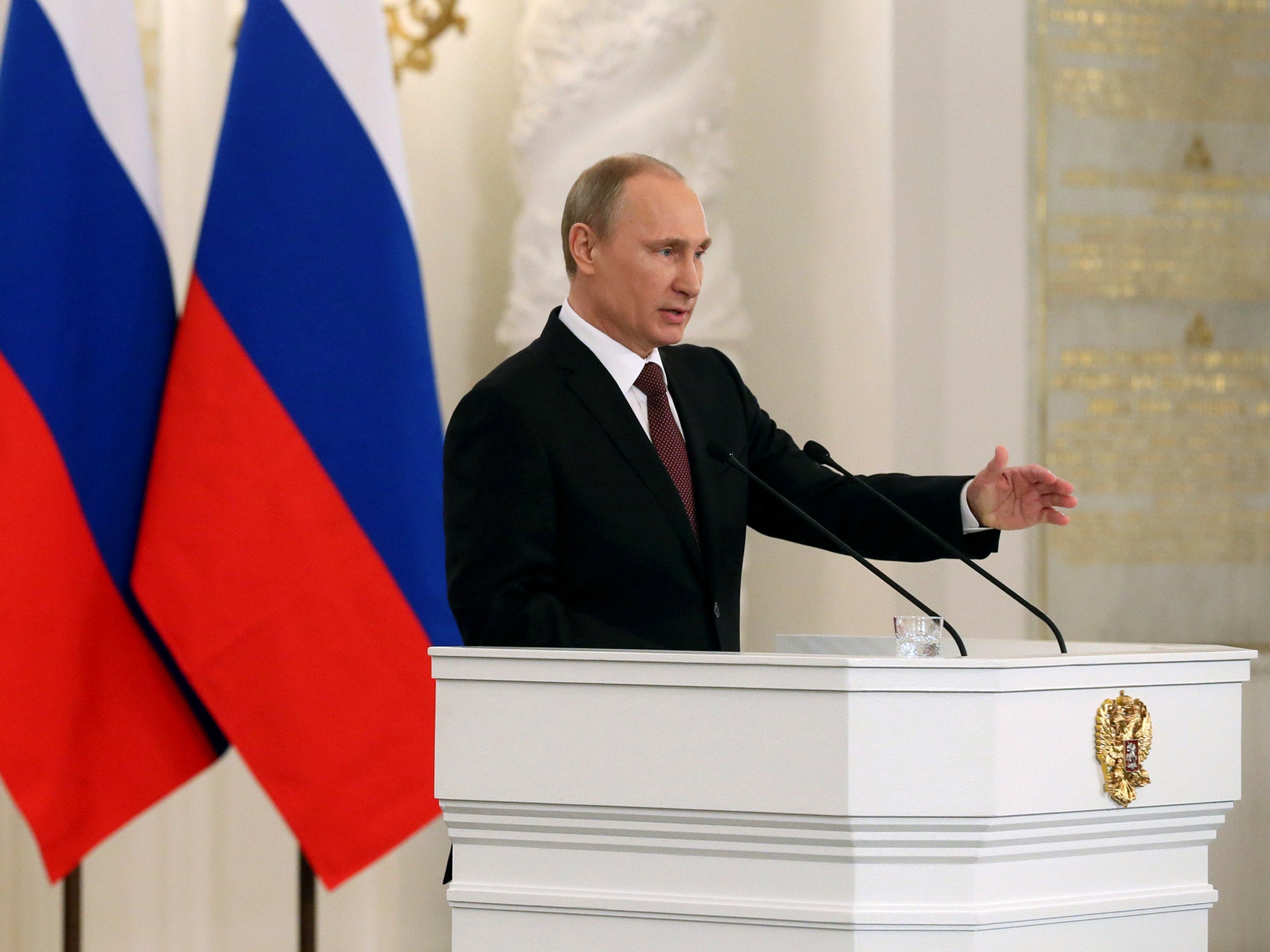President Putin finds his legacy in the fallout from Crimea


In his 14 years at the top of Russian politics, Vladimir Putin has become a past master at the set-piece occasion. But his speech to an enraptured audience from both houses of the Russian parliament in the Kremlin’s St George’s Hall may go down at home as his finest hour. Indeed, it may come to be what he and his presidency are remembered for.
Enormous flags billowed behind Putin as he made his formal request for members of the Duma to ratify the reunification, as he put it, of Crimea with the Russian homeland. He had no doubts, through three standing ovations, what their response would be.
This was a speech addressed to multiple audiences. President Putin’s first audience was the people of Crimea; there was a sense of vindication for Crimea’s Russians, who had, as he said referring to 1991, gone to bed one night in one country and awoke, as a minority, in another. There was also reassurance for the Tatars – recognition of their suffering, through banishment at the hands of Stalin – and also for Crimea’s Ukrainian minority.
A gracious touch (grace not being a quality associated with Putin) was his special thanks for the restraint shown by Ukrainian troops in Crimea. In decreeing that Ukrainian and Tatar would be recognised as official languages along with Russian, his sub-text was that “we Russians are not like the new rulers in Kiev whose first act was to rescind the recognition of Russian as Ukraine’s official second language”. The Kremlin was merely setting history right, in a peaceful and tolerant manner, Putin seemed to say.
His next audience was the Russians in Ukraine. For them, there was a pledge of moral support, but nothing more at this stage. Putin drew a sharp distinction between Crimea – charting its history and the way it was transferred to Ukraine in 1954 by Khrushchev – and his apparent acceptance of the rest of Ukraine within its current borders. Russians and Ukrainians, he said, were one people (“narod”), though they inhabited separate countries.
For the Russians in Russia, Putin channelled two decades of resentment against the West for the dissolution of the USSR. With a swell of patriotism, he explained that just as post-Soviet Russia had acquiesced in the “loss” of Crimea to Ukraine in the first place, when it signed the Budapest agreement of 1994, Russia had now broken that agreement to intervene in Crimea to bring it back. It was, he said, because a good neighbour had become a bad neighbour (run by extreme nationalists, anti-Russians and pro-Nazis), and there had been a real risk that Russia’s security would be jeopardised if Kiev’s new government were fast-tracked into Nato, ceding Sevastopol to the West.
Last, but certainly not least, was the Western audience. Putin reeled off his familiar litany of Western slights since the end of the Soviet Union: Nato expansion to Russia’s borders despite a promise to the contrary; missile defence; the intervention in former Yugoslavia; support for the “coloured” revolutions in Ukraine and Georgia; refusing to recognise that Russia had interests, too, and leaving it out in the cold.
Then there was the list of “double standards”; Russia was to be punished for annexing Crimea after holding a decisive referendum, but what about the interventions in Afghanistan and Iraq, and recognition of independence for Kosovo? Why should Kosovo’s Albanians be permitted to chart their own course, but not Crimea’s Russians?
Putin’s tone was more business-like than aggressive. He insisted that, while Russia had “reinforced” its troops in Crimea, it had not exceeded the ceiling agreed in 1994. Nor did he overtly share the triumph apparent in the hall. His clarity also suggested, if not an olive branch to Kiev and the West, some hint of how a settlement might be reached.
However, as Putin signed the annexation treaty with Crimean leaders, all audiences were left with no doubt that Russia’s move will not be reversed. This was a victory speech, given by an emboldened leader, on a day that will be seen by most Russians as a historic achievement.
Join our commenting forum
Join thought-provoking conversations, follow other Independent readers and see their replies
Comments
Bookmark popover
Removed from bookmarks